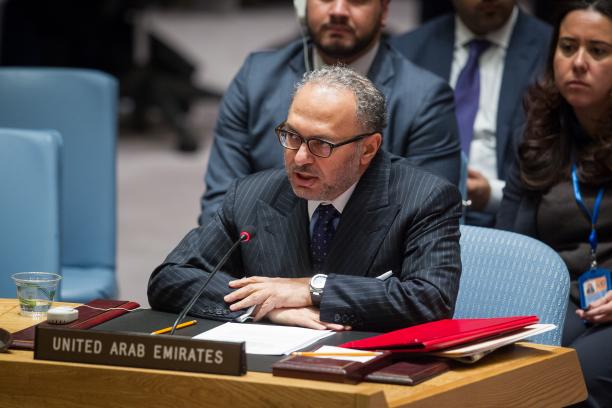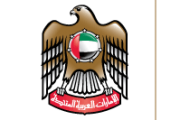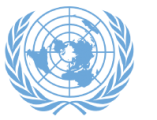
Thank you Mr. President [FM Wang Ji] for presiding over this important debate. I would also like to thank the Secretary-General for his briefing.
As we approach the 70th anniversary of the founding of this universal and indispensable Organization, the UAE reaffirms our commitment to the core principles of the Charter and takes this opportunity to reflect on how best to collectively equip the United Nations to deal with the ever-more complex challenges before us.
The pressure of these challenges is fracturing the global security order, and is being exploited by non-state actors. Today we need a strong and effective United Nations and Security Council more than at any time in recent history. In this context, the UAE would offer the following observations.
First, it is vital that the Security Council consults and coordinates with concerned states, even when dealing with fast-moving, complex situations. Reform of these working methods will make the Council more effective, and will ensure that the full range of perspectives of those countries most affected are considered.
Second, Chapter 8 of the Charter states “The Security Council shall encourage the development of pacific settlement of local disputes through such regional arrangements”. It is neighbouring states that have the most to gain from a peaceful resolution of a security crisis – and everything to lose from protracted conflict. The role of regional organisations as essential components of the international security system must be utilized and supported further by the Security Council.
Third, and perhaps most importantly, greater consideration must be taken of the human cost of protracted debates and inaction. For example, the Syrian crisis has forcibly displaced close to 11 million people – 3 million beyond its borders, and 7.6 million internally. Additionally, the suffering inflicted on the Palestinian population, within Palestine and in the diaspora, remains one of the gravest injustices in the Arab region, and has ramifications for the entire world.
In many parts of our region – specifically in Syria, Iraq, and Yemen – current challenges have highlighted further the need for legitimate, international engagement. On a positive note, we would like to commend the Security Council, and Jordan and the UK in particular, for their efforts to consult and involve the GCC on Resolution 2201. Implementation is now the priority challenge in Yemen, and the UAE stands ready to assist in this critical task. The UAE also reaffirms our commitment to the legitimate government headed by President Hadi, calls for the release of Prime Minister Bahah from house arrest, and urges a return to the political process that was derailed through the use of force by the Houthi militias.
With regard to Libya, the UAE was horrified by the recent atrocities and by the ongoing terrorist attacks plaguing Libya and neighboring countries. We extend our full support for SRSG Bernadino León’s endeavours; there is an urgent need for a political agreement. However, a political strategy must be accompanied by a muscular posture that will ensure that extremism and terrorism do not take advantage of the ongoing international mediation. That is why the UAE unconditionally endorses the draft resolution, led by Libya and Egypt, to lift the arms embargo on the legitimate Libyan authorities.
This is a necessary step for the legitimate Libyan government and the House of Representatives to exercise their sovereign power and to secure regional stability. Any delay in this will seriously impact the situation on the ground and send a dangerous signal to the militant groups responsible for the atrocities. The risks of the militants gaining control of Libya’s significant resources and utilizing them to export their extremist activities across borders are a clear and present danger – not only for our region, but for the world. Our resoluteness as the international community is required or we will face a much more complicated and dangerous situation in Libya.
We should also note where the international community is making progress. Last week, the UAE was one of 60 countries attending the White House Summit on Countering Violent Extremism where the anti-Daesh Coalition confirmed it has made strategic advances on the ground. Here, at the UN, the efforts made by the Security Council – including by the Russian Federation’s Resolution 2199 – to cut off the financial lifelines of these groups – and in Resolutions 2170 and 2178 on combating the flow of foreign fighters – are significant.
Further, normative developments to inhibit the transmission of extremist messages, for example through social media, are also encouraging. As President Obama announced at last week’s summit, the United States is joining the UAE in an effort to create a new digital communications hub to work with religious and civil society and community leaders to counter terrorist propaganda.
These efforts have been vital in the global campaign to tackle the threat of extremism. Next, we must focus on cooperating to eliminate the root causes of extremism In the UAE we are building a national model of moderation, tolerance and unity. We believe that our model is a contemporary counter-narrative to extremism and a clear refutation of the brutal and false message of the extremists.
The challenge of countering extremism requires an urgent, global, coordinated and multi-stakeholder effort. There are many important UN initiatives in place – particularly with regard to counter-terrorism – but there is now a critical need to support effective, State-led policy interventions to counter extremism through social, economic and political means and on multiple levels.
I am pleased to announce at the Security Council today that the UAE is launching a diplomatic initiative aimed at building international cooperation and facilitating dialogue through a “Contact Group on Countering Extremism”. This strategic effort will focus on developing and disseminating concrete solutions and best practice in countering extremism. The progress made through the Contact Group will complement and reinforce the efforts of the anti-Daesh coalition and support the UN to take “effective collective measures for the prevention and removal of threats in conformity with the principles of justice and international law”, as enshrined in the Charter.
Let me end by congratulating China on the successful stewardship of the Security Council during your Presidency.


